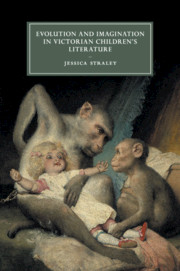Crossref Citations
This Book has been
cited by the following publications. This list is generated based on data provided by Crossref.
2016.
Evolution and Imagination in Victorian Children's Literature.
p.
253.
Beer, Gillian
2016.
Writing Arctic Disaster.
p.
307.
Beer, Gillian
2017.
Democratising Beauty in Nineteenth-Century Britain.
p.
297.
2017.
Gerard Manley Hopkins and the Poetry of Religious Experience.
2017.
Everyday Words and the Character of Prose in Nineteenth-Century Britain.
p.
287.
McEvoy-Levy, Siobhan
2018.
Peace and Resistance in Youth Cultures.
p.
83.
Pond, Kristen
Baker, William
Burke, Lois
Dickinson, Christian
Oulton, Carolyn
Wagner, Tamara
Stainthorp, Clare
Sullivan, Michael J
and
Barnes, Lucy
2018.
XIVThe Victorian Period.
The Year's Work in English Studies,
Vol. 97,
Issue. 1,
p.
693.
2018.
Idleness and Aesthetic Consciousness, 1815–1900.
p.
234.
Flegel, Monica
and
Parkes, Christopher
2018.
Cruel Children in Popular Texts and Cultures.
p.
1.
King, Amy M.
2019.
The Divine in the Commonplace.
2019.
The Divine in the Commonplace.
p.
298.
2019.
The Commodification of Identity in Victorian Narrative.
p.
280.
Ayyıldız, Nilay Erdem
2019.
Language, Power, and Ideology in Political Writing.
p.
55.
Clarke, Laura H.
2020.
Reverent Induction: Epistemology and the Romantic Education of the Child Reader in Charles Kingsley’s The Water-Babies (1863).
Cahiers victoriens et édouardiens,
Courtois, Cédric
2020.
“With the Exception of [Ali] Banana:” Second World War Bildung in the Burmese Jungle in Biyi Bandele’s.
Commonwealth Essays and Studies,
Vol. 43,
Issue. 1,
Kelen, Christopher
and
You, Chengcheng
2021.
“They’d Eaten Every One”: Food Anthropomorphism in “The Walrus and the Carpenter”.
English Studies,
Vol. 102,
Issue. 6,
p.
671.
2021.
Decadent Ecology in British Literature and Art, 1860–1910.
p.
261.
2021.
Convalescence in the Nineteenth-Century Novel.
p.
228.
Sussman, Matthew
2021.
Stylistic Virtue and Victorian Fiction.
2021.
Stylistic Virtue and Victorian Fiction.
p.
260.



